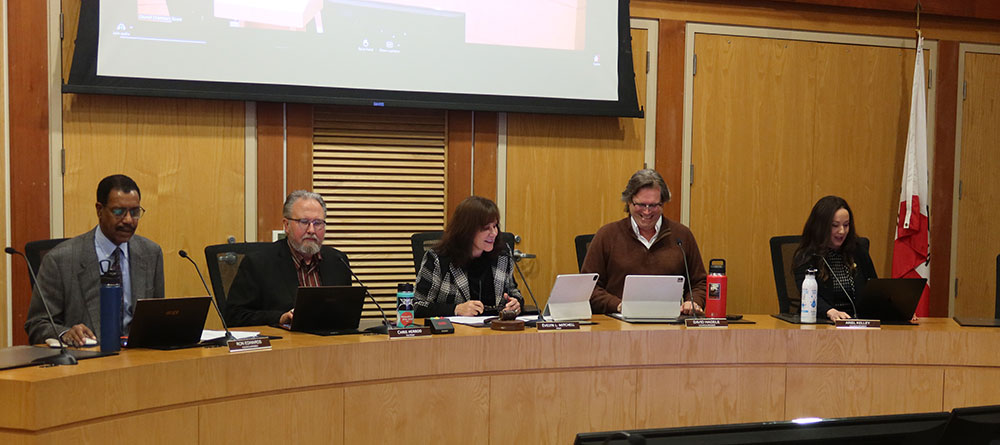A week ago Wednesday, retired attorney Jon Eisenberg filed civil suit against the City of Healdsburg, charging multiple Brown Act violations in two recent cases that demonstrate what he calls “a pattern of misbehavior that is deeply embedded in the culture of Healdsburg’s city government…” His action focused on what he called the “tainted decision making” in the effort to get Measure O on the ballot and the campaign to get it passed; and the transition to district elections now underway.
The suit could not have been a surprise to the city’s council members or staff, who have been aware for months if not years that Eisenberg has taken a focused interest in the workings of city government.

The filing of Jan. 29 by Eisenberg’s attorneys Christian Baker and Jacob Itzkowitz largely echoes Eisenberg’s own complaints of a month previous, delivered in a Dec. 26 letter and email to the city manager, city attorney and every member of the current City Council. In that message he gave notice that he was preparing to “commence litigation,” though he did proffer a settlement.
Eisenberg’s letter cited several Brown Act violations as well as unlawful expenditure on the Measure O campaign, noncompliance with California Public Records Act and the city’s failure to publish minutes of City Council meetings for the previous 15 months.
Add to these his complaints about the then-recent Dec. 16 City Council hearing on the transition to district elections, which he also faulted. “Plainly this misbehavior is deeply embedded in the culture of our city government,” wrote Eisenberg. “The purpose of this letter is to help set the City Council on a law-abiding path,” he concluded.
In that first letter he outlined his case for filing a complaint, but said he would not do so if the council agreed to his proposed settlement, which included the admission of violations of law by each council member, their agreement not to “commit any such violation in the future,” training in Browns Act and other relevant transparency laws for city employees, and the like.
The city chose not to take him up on his offer.
‘Brown Acting’
Many of the specific incidents that gave rise to Eisenberg’s charges pertaining to meetings and communications between council members, the city attorney and/or the city manager, would be violations of the Brown Act. The Brown Act became law in 1953, and applies broadly to local agencies such as city councils, school boards and county boards of supervisors. Such ceremonial meetings as “ribbon-cuttings” or meetings where a quorum is not present do not fall under Brown Act regulation.
That act is generally seen as a powerful requirement for transparency and public knowledge about civic activity, mandating open and transparent government meetings for local legislative bodies.
Among its rules are the timely posting and pre-publication of a meeting’s agenda, permission for public comment, restrictions on “closed sessions” and others. By its own terms the Brown Act explicitly prohibits the use of “direct communication, personal intermediaries, or technological devices that is employed by a majority of the members of the legislative body to develop a collective concurrence as to action to be taken on an item by the members of the legislative body.”
In other words, it is expected that council debate on any item be public, and no backroom deals can accelerate the consideration or passage of a piece of business.
The filing of Jan. 29 largely echoes Eisenberg’s complaints of the previous month, going into detail on 18 different “causes of action,” most pertaining to meetings and communications between council members, the city attorney and/or the city manager, that potentially violate the Brown Act.
The filing itemizes many such possible cases, but evidence for them is more circumstantial than documented. This is the argument presented by the city legal staff in rebuttal to Eisenberg’s charges. In city attorney Samantha Zutler’s Jan. 15 response to Eisenberg’s “cure and correct” letter of Dec. 26, she writes: “The City engaged in no illegal or inappropriate conduct. The Council has taken no formal action regarding the redistricting process. There were no secret or serial meetings, nor did the Council meet in closed session to ‘agree’ to positions that they could (and did) articulate on the dais. All of the City’s actions complied with the Brown Act, and there is nothing for the City to cure or correct.”

Her letter was followed on Jan. 27 by another one to Baker, this time from litigation counsel Mark J. Austin, of the same law firm as Zutler. He is no more gracious in “declining” Eisenberg’s settlement offer. “As explained below, none of the alleged violations have occurred. Indeed, to reach his conclusions, your client relies on a number of speculative leaps that are inconsistent with the facts and engages in blatant misapplications of the law.”
The Plaintiff
Jon Eisenberg moved to Healdsburg in 2016, following a successful career as an appeals court lawyer that included a number of high-profile cases. “Government secrecy has been a focus of my career,” he said, including such cases as a challenge to the second Bush administration’s post-9/11 warrantless wiretapping program and, on the other side of the political divide, a challenge to the Obama administration’s treatment of hunger-striking Guantanamo Bay detainees.
Though he said had no intention of getting into city governance, he did so when a friend of his complained about the required fine on a parking ticket. Eisenberg looked into it, exploring state and local laws, and then pointed out to the city that parking fines in Healdsburg were illegal.
“At every level of government, misconduct hides behind secrecy and thrives on public apathy”
Jon Eisenberg
His objections were taken lightly by the city, almost dismissively, a response that did not endear him to the city’s management. “I don’t look for these problems,” he said. “They somehow find me.”
Initially he had no great familiarity with the Brown Act, but as 2023 went on he came to suspect that the City Council had violated the Brown Act by not adequately publicizing the purpose of “closed sessions,” which while not open to the public still had their required disclosures.
“I considered suing but decided not to because I thought those violations might have just been one-offs. By mid-2024, I was well versed in the Brown Act and watched with amazement as the Measure O debacle unfolded.”
In the Weeds

It’s not the first time the City Council has faced charges of Brown Act violations. Following the choice of Jane and Solful as the city’s first licensed cannabis dispensaries, losing applicant Mercy Wellness took the city to court over perceived Brown Act violations that prevented them from getting the license. The decision was reached by the council in November 2023, which Mercy Wellness (and perhaps others) found to be an unusually rapid selection in a controversial process.
In February 2024 the company’s CEO, Brandon Levine, sued to void the decision, essentially saying it would have been impossible for the council to reach the decision it did without illegal communications between members. Late in the year, however, the Sonoma County Superior Court ruled in favor of the City’s defense in Mercy’s lawsuit, and Zutler said Levine did not show up at the reading of the ruling to argue against it. (Levine says his response “was completely ignored and we will not let this slide,” and he will appeal.)
Zutler’s response to Eisenberg’s accusations is to be expected from a city attorney whose job it is to help a city navigate legal challenges—or avoid them in the first place. In an email to the Tribune, she put the legal action in a larger context of skepticism, if not anger, directed toward governing bodies.
As city attorney of three cities, and in communication with many others, she said she sees “some version of Healdsburg’s current experience in all of them. Whether it’s a dramatic increase in public records requests, complaints to the FPPC, recall efforts or direct attacks on City staff—something about this political moment has engendered a mistrust of government that is manifesting in all sorts of ways. It’s unfortunate (not to mention expensive and time consuming), but it seems to be where we are right now.”
As Eisenberg stated in his Dec. 26 letter, “I seek no personal gain here. If litigation ensues, I will retain counsel and pursue reimbursement only for attorney’s fees I pay to my counsel and will not seek compensation for my personal expenditure of time. My only goal here is to help improve the quality of local government in Healdsburg.”









Jon Eisenberg, ” My only goal here is to help improve the quality of local government in Healdsburg.”
Well, Jon, run for City Council, or better yet, put up a petition to end the City Council and go to a City Manager system. One official, the city manager, manages the city budget. That’s all Healdsburg needs.
Get rid of the zoning laws as well.
If your neighbor builds something you don’t like, hire a lawyer and sue them yourself. Leave the city government out of it.
If you don’t believe in coincidences, you can’t believe our City Council. If you read the events listed in Jon Eisenberg’s complaint, even the most gullible person would have to admit that the council colluded in order to try to get Measure O passed. What are the odds that you could have five people representing a town where a large majority voted against Measure O to unanimously vote to put the measure on the ballot. The council knew that they were going to approve Measure O at least two weeks before they voted on June 17, 2024. Otherwise, why did they approve $62,000 to be spent on a political public relations firm two weeks prior to the vote (see agenda item below)? They wanted to hit the ground running with their propaganda. Measure O was a deceitful campaign, and it’s time someone was held accountable.
City Council/RSA Regular Meeting Agenda
June 3, 2024
Page 3
Professional Services Agreement for Strategic Communication Services
Adopt a Resolution approving a Professional Services Agreement with Clifford Moss and
Associates with a not to exceed amount of $62,000 and subject to Council placing a
Growth Management Ordinance amendment on the November Ballot.